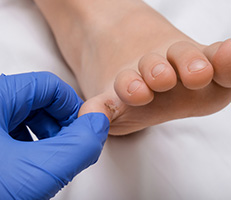Psoriasis is a chronic inflammatory disease of the immune system that causes excess skin cells to build upon the surface of your skin. Although there are many different forms of the condition, about 80% of psoriasis patients have the type known as plaque psoriasis, which causes red, raised patches of skin covered with silvery-white scales. At Indigo Dermatology in Melbourne, FL, Tampa, FL & Palm Bay, FL, our dermatologists provide effective management strategies for patients with psoriasis. To learn more, call or book your appointment online today.
Psoriasis Specialist
Psoriasis Q & A
What causes psoriasis?
Psoriasis is the result an error in your immune system that prompts skin cells to grow too quickly. Rather than forming in a week, as usual, these new skin cells form in just a matter of days. These excess cells pile up on the surface of your skin and form patches; as skin cells continue to grow and accumulate, the patches become thicker and scalier.
Although psoriasis isn’t contagious, psoriasis patches can be itchy and sore. They may also become dry and form cracks that bleed.
Researchers believe both genetic and environmental factors play a role in the development of the disease. Certain factors are known to trigger the condition or make it worse, including:
- Certain infections, such as strep throat
- Skin injuries, including cuts or sunburns
- Vitamin D deficiency
- Chronic psychological stress
- Certain medications, including beta blockers
- Smoking or heavy alcohol consumption
What are the different forms of psoriasis?
Psoriasis takes many forms; the five most common are:
Plaque psoriasis
The most common form, plaque psoriasis causes dry, raised, red lesions covered with white or silvery scales. Plaque lesions may be few or many, and they can appear anywhere, including on the inside of your mouth.
Guttate psoriasis
This condition is often triggered by a bacterial infection, and mostly affects children and adolescents. Instead of causing thick lesions, guttate psoriasis causes small scaling lesions on the trunk, arms, legs or scalp.
Inverse psoriasis
Usually triggered by fungal infections, inverse psoriasis causes smooth patches of red, inflamed skin to develop in the armpits, groin region, or under the breasts.
Nail psoriasis
This type of psoriasis affects fingernails and toenails. While it typically causes pitting, abnormal nail growth, and discoloration, it can also cause nails to come away from the nail bed.
Psoriatic arthritis
This form of psoriasis is unique in that it causes swollen, painful joints as well as inflamed, scaly patches of skin. Symptoms may be mild or severe and can affect any joint.
How is psoriasis treated?
Psoriasis is a chronic condition that can’t be cured. The goal, therefore, of any psoriasis treatment is to effectively manage the condition by reducing inflammation and clearing your skin.
Topical treatments, such as corticosteroids and retinoids, are medicated creams or lotions that you can apply directly to the lesions. They work best for mild to moderate cases of psoriasis.
More severe cases of the disease often respond best to a combination of topical lotions and oral or injected medications; most of these medications can only be taken for short periods of time, however.
Indigo also offers Xtrac treatment. Xtrac is a small handheld device that emits a concentrated single band of ultraviolet B (UVB) light on psoriasis lesions. The light penetrates the skin, breaking down the DNA of the T cells that are responsible for creating the psoriasis plaques. It slows cell turnover to help reduce scaling and inflammation.
Because light therapy doesn’t target healthy tissues, it can safely deliver a high-dose treatment of ultraviolet light for faster clearing and longer remission.

Book Your Consultation
Follow Us on Social Media








